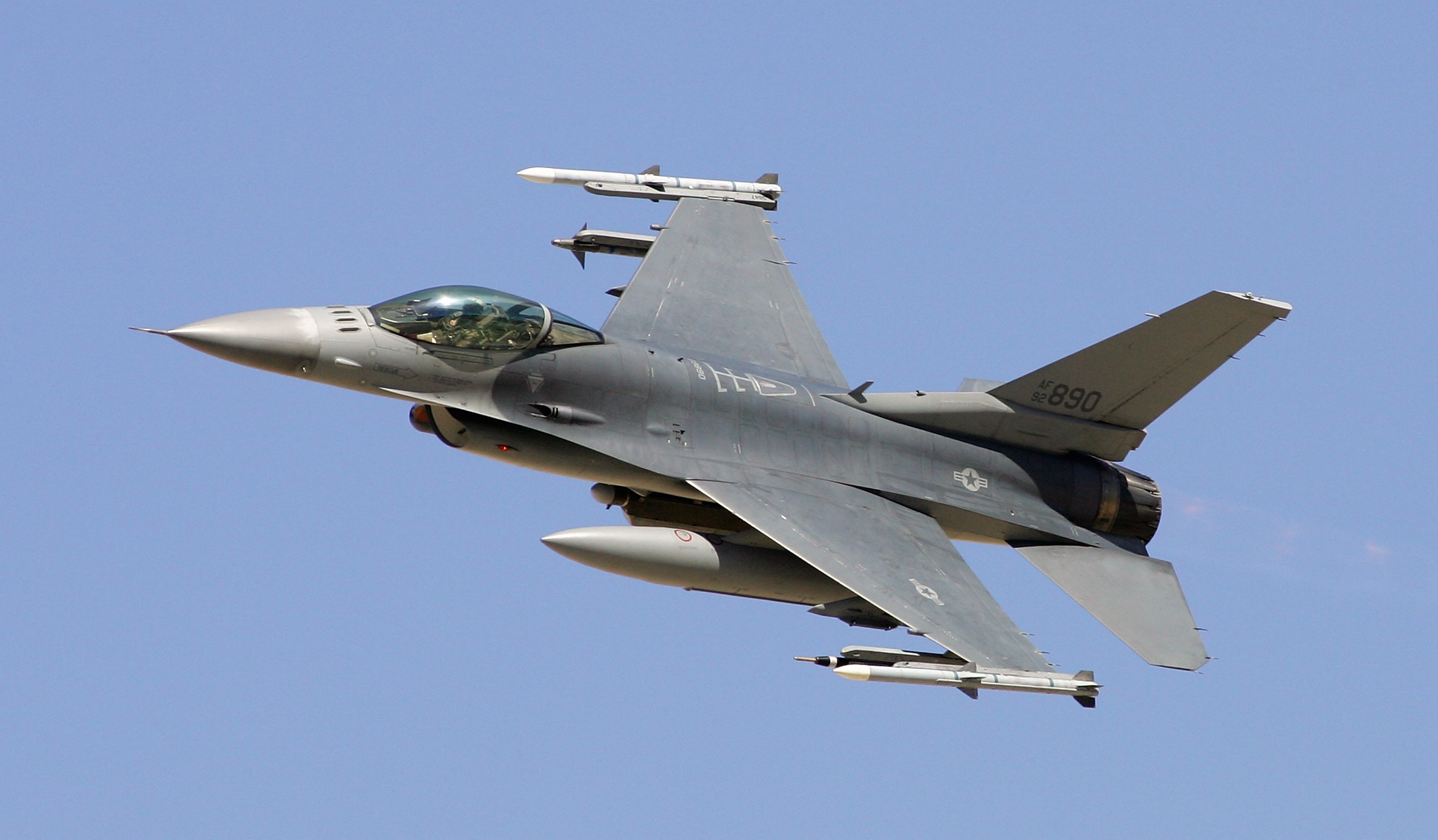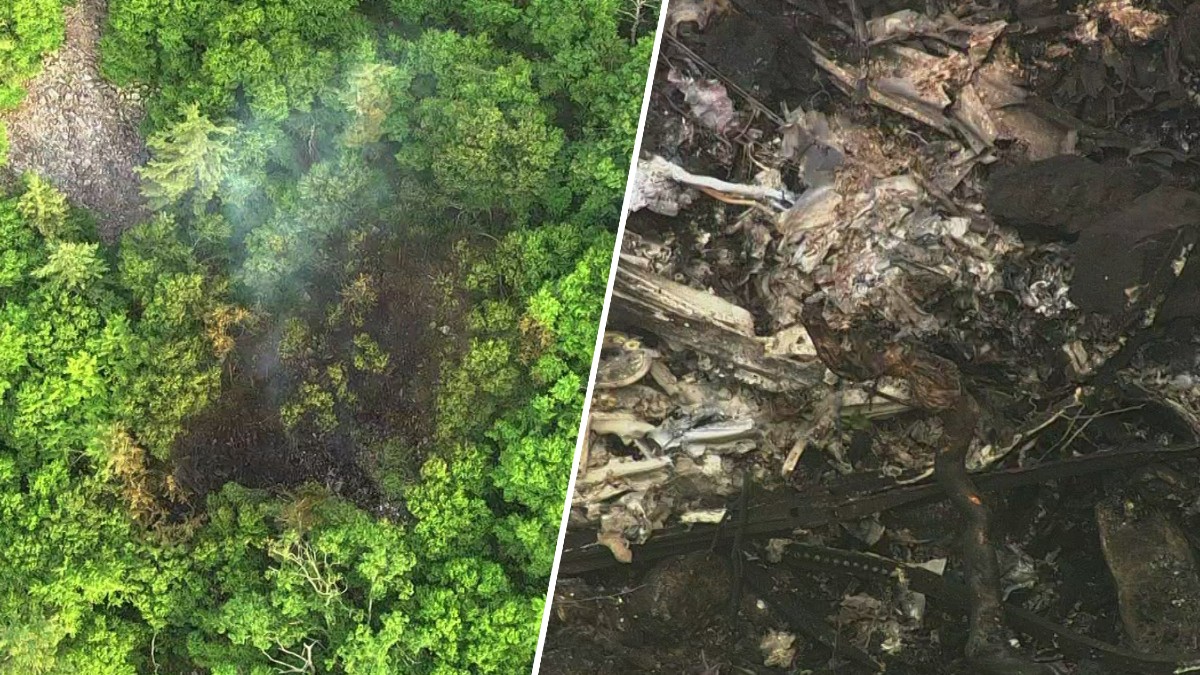Four people are dead after a plane with an unresponsive pilot flew through restricted airspace in Washington, D.C., then crashed in Virginia on Sunday as it was followed by fighter jets authorized to fly at supersonic speed, officials said.
The crash left behind “highly fragmented” wreckage in a mountainous area that will take days to gather and sort, federal authorities said Monday.
F-16s dispatched by North American Aerospace Defense Command (NORAD) set off a sonic boom heard and felt from Annapolis to Fredericksburg, Virginia, as they scrambled to intercept the Cessna Citation private jet. An unusual flight path caught the Federal Aviation Administration's attention, and the pilot had stopped responding to air traffic control operators.
We've got the news you need to know to start your day. Sign up for the First & 4Most morning newsletter — delivered to your inbox daily. >Sign up here.
The FAA said in a brief update Monday that the pilot and three passengers were killed and that the plane was “destroyed” in the crash.
NBC News reported that the Cessna Citation belonged to John Rumpel from Melbourne, Florida. Rumpel said his daughter, granddaughter, nanny and their pilot were all on board.
The mother and her daughter were returning home to the Hamptons, News4 New York reported.
Lakhinder Vohra told News4 New York his friend Adina Azarian, a Hamptons realtor, and her 2-year-old daughter, Aria, were on the Cessna.

The Cessna crashed after it ran out of fuel, multiple government sources say. NORAD says the fighter jets did not take down the Cessna.
Had the plane started to lose altitude and head toward a populated area, it could have been shot down.
“It’s a very dynamic situation at that point, where the military has to make a call either way,” NBC News aviation expert Jeff Guzzetti said.
A decision to shoot down a plane would have to go up the chain of command, possibly to the president, Guzzetti said.
In this case, the F-16s followed the plane and determined it was better just to let it run out of fuel.
“They could tell that it was heading toward a very remote area – the George Washington National Forest – so the decision was easy for them,” Guzzetti said.
It will take days to collect debris from the plane, FAA says
Virginia State Police returned to the crash scene early Monday with an NTSB representative to collect evidence and recover remains. Officials said they expect to be on the scene at least three to four days.
Speaking at a briefing Monday morning, NTSB investigator Adam Gerhardt said the wreckage is “highly fragmented” and investigators will examine the most delicate evidence on the scene, after which the wreckage will be moved, perhaps by helicopter, to Delaware, where it can be examined, he said. The plane is not required to have a flight recorder but it is possible and there are other avionics equipment that will have data that they can examine, Gerhardt said.
Investigators will look at when the pilot became unresponsive and why the aircraft flew the path that it did, he said. They will consider several factors that are routinely examined in such probes, including the plane, its engines, weather conditions, pilot qualifications and maintenance records, he said.
“Everything is on the table until we slowly and methodically remove different components and elements that will be relevant for this safety investigation,” he said.
A preliminary report will be released in 10 days, and a final report will be released in 12 to 24 months, he said.
Cessna jet turned around and pilot was unresponsive before crash in Virginia
The Cessna Citation jet left the Elizabethton Municipal Airport in Elizabethton, Tennessee, at 1:13 p.m. Sunday, bound for Long Island MacArthur Airport in New York, a senior government official told NBC News.
Fifteen minutes later, air traffic control in Atlanta told the plane to stop its climb at 33,000 feet, but the pilot never responded.
Multiple attempts were made to contact the plane over the next two hours, the official said.
According to plane tracking website FlightAware, the Cessna flew to the New York area. Then the plane turned around, flew on a southwest path and did not respond to air traffic control, sources said.
The plane flew directly over the nation's capital, some of the most heavily restricted airspace in the nation.
According to the Pentagon, six F-16 fighter jets were immediately deployed to intercept the plane. Officials said they were authorized to fly at supersonic speed. Two aircraft from the 113th Fighter Wing, out of Joint Base Andrews in Maryland were the first to reach the Cessna to begin attempts to contact the pilot. Two F-16 aircraft out of New Jersey and two from South Carolina also responded to the incident.
D.C. Director of Homeland Security Chris Rodriguez said the city itself was given advanced notification the plane was on the way. D.C. officials were alerted at 3 p.m. that a plane was headed to restricted air space and informed that fighter jets would be scrambled.
”We were in contact with our federal partners throughout the event, and when it was determined - by the DOD – by the Department of Defense – that there was no active threat, we messaged that to the public immediately,” Rodriguez said.
Due to the Cessna's very high altitude, it was determined there was no threat to the immediate area.
Shortly after 3 p.m., concerned citizens began flooding 911 call centers and news organizations throughout the capital region.
The Cessna flew at an altitude of 39,000 feet more than 450 mph directly over Northwest D.C. and through Virginia, according to FlightAware. A defense official told NBC News that NORAD F-16s scrambled, began shadowing the plane and saw the pilot onboard was incapacitated before it crashed at 3:32 p.m.
“By far the most likely suspect is some sort of a pressurization issue,” William Waldock, a professor of safety science who teaches aircraft accident investigation at Embry-Riddle Aeronautical University in Prescott, Arizona, told the Associated Press.
“You don’t have too much time in a rapid depressurization situation to get on oxygen, because if you’re high at altitude and you lose pressurization, all of the oxygen molecules in your body escape immediately,” Guzzetti said. "It isn’t like holding your breath or anything like that. You’ve got to be on oxygen within five seconds or you’ll begin to lose consciousness.”
The situation is similar to a 1999 event when pro golfer Payne Stewart and his pilot were unresponsive and their plane ran out of fuel before crashing.
Virginia State Police said first responders walked over difficult terrain and amid heavy fog to the crash site and arrived just before 8 p.m., but there were no survivors.
Chopper4 flew over the fiery scene in the George Washington National Forest. There was smoke rising from the crash site and charred, unrecognizable jet debris.
D.C.'s homeland security agency said the department was “aware of reports from communities throughout the National Capital Region of a loud ‘boom’ this afternoon. There is no threat at this time.”
News4 sends breaking news stories by email. Go here to sign up to get breaking news alerts in your inbox.



